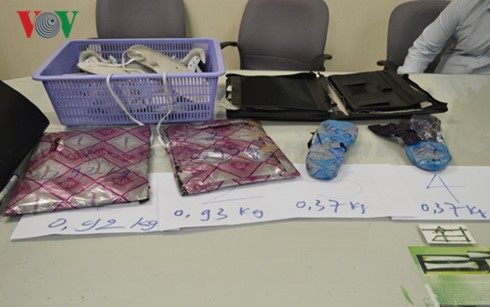(VOVworld)- The 2016 UN General Assembly Special Session (UNGASS) on the World Drug Problem, which ended on April 21, was held for the first time in 2 decades. UN officials and world leaders discussed a new approach of the fight against drugs, putting people at the centre. However, differences between countries spark concerns about anti-drug efforts.
 |
| Smuggled drugs detected at Tan Son Nhat airport |
The meeting was attended by more than 1,000 delegates from UN member countries, territories, international organizations and inter-governmental and non-governmental organizations.
In 1998, the UN General Assembly held a Special Session on the World Drug Problem (1998 UNGASS), which approved a political statement and anti-drug measures. 18 years later, little progress was made. According to a report by the United Nations Office on Drugs and Crime (UNODC), 246 million people, equivalent to 5% of the world’s population aged from 15 to 64, did use drugs illegally. Drugs-related casualties in 2013 numbered 187,000. In 2014, the global opium output reached 7,550 tones, the second highest since late 1930. The use of cannabis is predicted to increase in many regions.
The 2016 Special Session on the World Drug Problem agreed on the need to address the issue, but how to address it encounters mixed reactions from 193 member countries. Many countries prefer reducing criminalizing the use of drugs and mitigating the harmful effects of drug abuse. Leaders from some Latin American countries argued that arresting and jailing drug edicts did not help them give up drugs and that the aggressive fights against drugs for decades failed, ruining lives of thousands of people all over the world.
Mexican President Enrique Pena Nieto proposed certain flexibility and change of ineffective policies. Guatemalan President Jimmy Morales stressed on the humanitarian approach and improvement of public health instead of punitive measures. He added drugs-related policies should match joint statement on human rights and putting the people at the centre, rather than drug substances.
Singapore, China, Thailand, Iran and Russia were consistent with their tough policies, including executing drug criminals and opposing the legalization of drugs. Singaporean Minister for Home Affairs and Law Kasiviswanathan Shanmugam said such approach would trigger widespread drug trafficking and use, destroying the whole society in Singapore, where 200 million travelers transit annually.
Obviously, authorities have failed to agree on a joint solution, challenging the global fight against drugs.